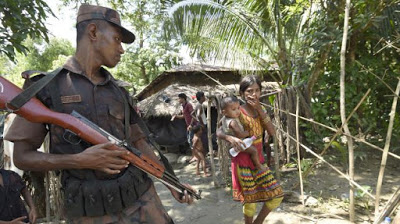Slow Genocide Continues in Myanmar
SPOTLIGHT, 25 Sep 2017
Mizanur Rahman Khan – TRANSCEND Media Service

A Bangladesh border guard looking at Rohingya refugees at the Jalpatoli refugee camp in the no-man’s land area between Myanmar and Bangladesh, near Gumdhum village in Ukhia. Photo: AFP
22 Sep 2017 – Witnesses at the Permanent Peoples Tribunal in Kuala Lumpur on Tuesday [19 Sep] said a slow genocide is going on in Myanmar.
Human rights activist Maung Zarni, a Buddhist, in his statement, said the military government led by the then general Ziaur Rahman in 1978 had threatened the Myanmar government of supplying arms unless it took back its nationals from Bangladesh through bilateral talks.
Maung said in a space of four days of threat, the then president of Myanmar, Ne Win, instantly agreed to take back his nationals. Considering the threat as dishonour, he added, Ne Win made the Rohingyas stateless by formulating the Citizen Act in 1982.
Maung Zarni said a liberal democracy existed in Myanmar between 1948 and 1962. But, he pointed out, the rights of the Rohingya people were denied immediately after Ne Win had seized power through a coup in 1962.
Since then, Rohingyas are being made victims of, what he called as, “slow genocide”.
He rejected the Myanmar government’s campaign that its army launched the operation following the attacks by Arakan Rohingya Salvation Army (ARSA) on 25 August.
Zarni said the Rohingya Muslims are being persecuted due to their ethnicity.
Maung Zarni himself introduced the idea of slow genocide in the international law.
Nobel laureate Amartya Sen agreed with the view that the latest persecution of Rohingyas in Rakhine state was slow genocide.
Zarni is the founder of Free Burma Coalition. The Myanmar government suspects Zarni to be a supporter of the Rohingyas.
Terming Rohingyas as one of the ethnic groups of Myanmar, Maung said noted Scottish geographer Francis Buchanan mentioned Rohingyas of Arakan as natives in 1778. So in all respects, he insisted, Rohingyas are the citizens of Arakan.
Maung said the citizen act of 1982 is a tool to launch genocide against Rohingyas.
The seven-member panel of judges led by Argentine lawyer Daniel Feierstein asked if ARSA did really exist on Myanmar soil.
Witnesses answered in the affirmative but pointed out that their number was less than 50.
Two witnesses claimed that those who indulged in rape and torture alongside Myanmar security forces, spoke Bangla.
The two witnesses are executive editor of Rohingya news agency Kaladan Press Network, Tin Soe and writer of Witness to Horror, Razia Sultana.
Razia Sultana interviewed 21 Rohingya women of nine villages who were victims of military operations between October and December 2016.
Nineteen out of 21 women had lost their husbands while 16 children of 11 women were killed.
“Some 100 women including me were gathered in a field and they separated 10 beautiful ones including girls of 10 to 12 years of age,” Razia Sultana quoted a woman of Kya Khat Chang village in Myanmar as saying.
The hearing on the atrocities committed against other Muslims, who are not Rohingays, is scheduled to be held today (20 Sep, Wednesday).
____________________________________________
 Dr. Maung Zarni is a Burmese activist blogger, Associate Fellow at the University of Malaya, a member of the TRANSCEND Network for Peace, Development and Environment, founder and director of the Free Burma Coalition (1995-2004), a visiting fellow (2011-13) at the Civil Society and Human Security Research Unit, London School of Economics, and a nonresident scholar with the Sleuk Rith Institute in Cambodia. His forthcoming book on Burma will be published by Yale University Press. He was educated in the US where he lived and worked for 17 years.
Dr. Maung Zarni is a Burmese activist blogger, Associate Fellow at the University of Malaya, a member of the TRANSCEND Network for Peace, Development and Environment, founder and director of the Free Burma Coalition (1995-2004), a visiting fellow (2011-13) at the Civil Society and Human Security Research Unit, London School of Economics, and a nonresident scholar with the Sleuk Rith Institute in Cambodia. His forthcoming book on Burma will be published by Yale University Press. He was educated in the US where he lived and worked for 17 years.
Go to Original – maungzarni.net
DISCLAIMER: The statements, views and opinions expressed in pieces republished here are solely those of the authors and do not necessarily represent those of TMS. In accordance with title 17 U.S.C. section 107, this material is distributed without profit to those who have expressed a prior interest in receiving the included information for research and educational purposes. TMS has no affiliation whatsoever with the originator of this article nor is TMS endorsed or sponsored by the originator. “GO TO ORIGINAL” links are provided as a convenience to our readers and allow for verification of authenticity. However, as originating pages are often updated by their originating host sites, the versions posted may not match the versions our readers view when clicking the “GO TO ORIGINAL” links. This site contains copyrighted material the use of which has not always been specifically authorized by the copyright owner. We are making such material available in our efforts to advance understanding of environmental, political, human rights, economic, democracy, scientific, and social justice issues, etc. We believe this constitutes a ‘fair use’ of any such copyrighted material as provided for in section 107 of the US Copyright Law. In accordance with Title 17 U.S.C. Section 107, the material on this site is distributed without profit to those who have expressed a prior interest in receiving the included information for research and educational purposes. For more information go to: http://www.law.cornell.edu/uscode/17/107.shtml. If you wish to use copyrighted material from this site for purposes of your own that go beyond ‘fair use’, you must obtain permission from the copyright owner.